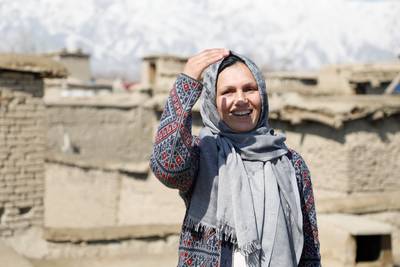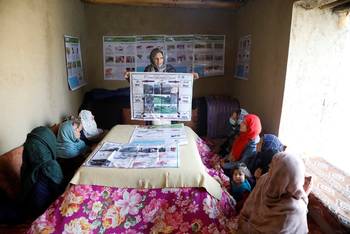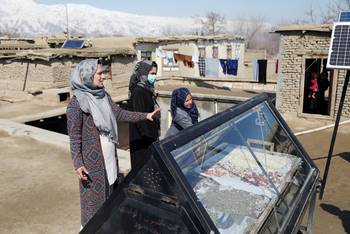Empowering women to improve their livelihoods in Afghanistan
The story of a women trainer fighting for the rights of women

- Mushtari Hesari standing outside a food processing center. ©FAO/Azizyar
“Now not only have I managed to support my family economically but have also gained many life skills that has assisted me to generate income, educate my children and help them have a better future”. Mushtari Hesari is a mother of four children and lives in Parwan province. She believes that if she can be a self-sufficient woman, others can be too. This is actually then us who should provide the opportunity for women like Mushtari to grow.
Women account for 50 percent of Afghanistan’s population, yet their participation in socio-economic affairs is negligible. Women are not fully involved in many affairs due to cultural issues, lack of literacy and lack of awareness on the standard methods of food production. Mushtari believes that if better opportunities are provided to women, they can be considerable support to the households’ economy.

- Mushtari explaining methods of food production to the women at the training center. ©FAO/Azizyar
Mushtari lives in a place where women are rarely involved in making decisions about their life and their future. And economically, they are very much dependent on the male members of the family. However, Mushtari as an educated woman graduated from the faculty of literacy always thought of improving the lives and livelihoods of the women in her community. This made her decide to take further step and do something for the women in her community.
Before joining FAO training, Mushtari was running a literacy class where she was teaching basic reading and writing skills to the women of her society, however that was not enough to bring changes in the lives of other women.
Mushtari then attended a five-day FAO training course on the establishment of dairy cooperatives, cattle management and good agriculture practices. She then became an active member of the Integrated Dairy Scheme (IDS) project and started her work as a field women trainer in 2014. She then also had a chance to participate in an exposure visit to India that further supported her to expand her knowledge.
After completing the training, Mushtari started transferring her knowledge and experience to other women in the community. At the beginning it was very difficult for her to convince the families of women to allow them to attend training classes, however as time passed on, people in the community realized her honest service. They realized that creating opportunities for poor women can help them have sustainable income sources and improve their livelihoods.

- Mushtari explaining hygienic food production practices to women in the community. ©FAO/Azizyar
Thanks to the IDS project, Mushtari proudly says nowadays that she has managed to train more than 1000 women in cattle management and good agriculture practices she has also formed Self Help Groups (SHG) with the aim to build the financial capacity of these women and generate income at the community level. Through these groups, poor and marginalized women get together, help each other and solve their individual problems. They have also set up their group saving boxes, where they collect and save their money and use it at the time of need or when they want to start a small business. Mushtari has managed to establish 54 women SHGs across Parwan, consist of 20-25 members per group on average.
“The women in these groups have their vegetables and milk to sell and generate income. This has helped them support their families and send their children to school”, says Mushtari proudly. These women are also selling their homemade products in local markets and at exhibitions, and generate additional income.
Mushtari has become a role model to many other women who want to do something with their lives as well as contribute to the sustainable livelihoods in the country.
